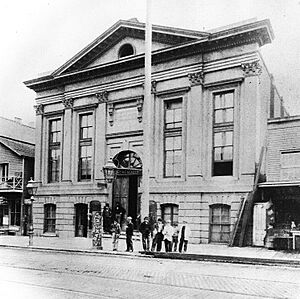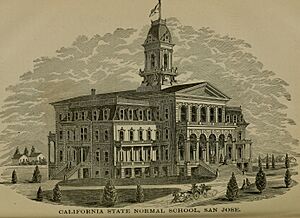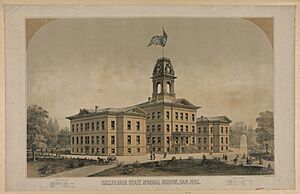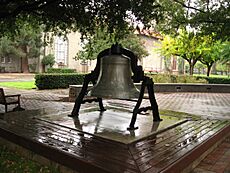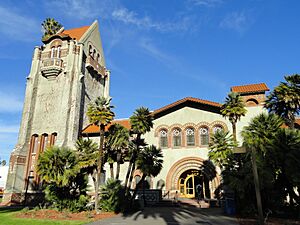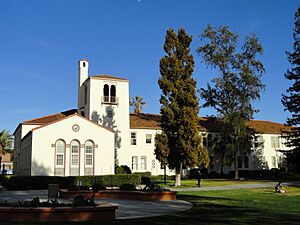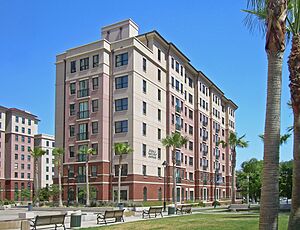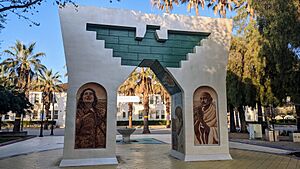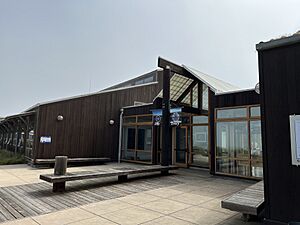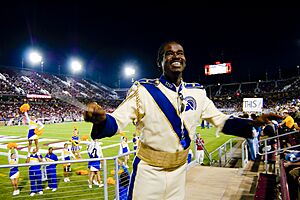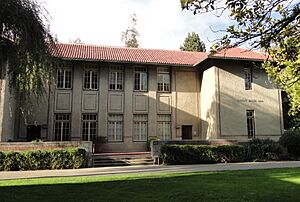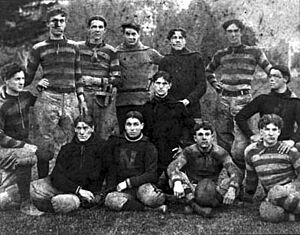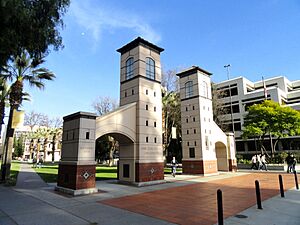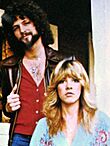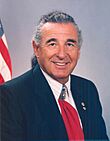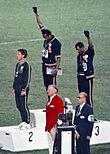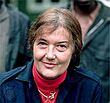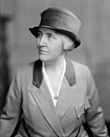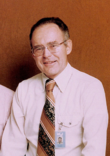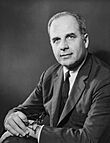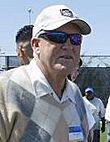San Jose State University facts for kids
 |
|
|
Former name
|
Minns' Evening Normal School (1857–1862) California State Normal School (1862–1921) San Jose State Teachers College (1921–1935) San Jose State College (1935–1972) California State University, San Jose (1972–1974) |
|---|---|
| Motto | "Powering Silicon Valley" |
| Type | Public research university |
| Established | 1857 |
| Founder | George W. Minns |
|
Parent institution
|
California State University |
| Accreditation | WSCUC |
|
Academic affiliations
|
|
| Endowment | $242 million (2024–25) |
| Budget | $481.8 million (2023–24) |
| President | Cynthia Teniente-Matson |
| Provost | Vincent Del Casino |
|
Academic staff
|
2,177 (Fall 2024) |
|
Administrative staff
|
1,424 (Fall 2022) |
| Students | 37,661 (Fall 2024) |
| Undergraduates | 27,354 (Fall 2024) |
| Postgraduates | 5,468 (Fall 2024) |
| Location |
,
,
U.S.
37°20′07″N 121°52′53″W / 37.3353°N 121.8813°W |
| Campus | Large city, 154 acres (62 ha) on main campus and 62 acres (25 ha) on south campus |
| Newspaper | The Spartan Daily |
| Colors | Blue and gold |
| Nickname | Spartans |
|
Sporting affiliations
|
|
| Mascot | Sammy Spartan |
 |
|
| Official name: First Normal School in California (San Jose State College) | |
| Designated | 1/6/1949 |
| Reference no. | 417 |
San José State University, often called San Jose State or SJSU, is a public university in San Jose, California. It started in 1857 as the state's first school for training teachers. This makes it the oldest public university in the western United States. It's also the very first campus of the California State University system.
SJSU is located in downtown San Jose. Its main campus covers about 154 acres, which is like 19 city blocks. The university offers over 250 different study programs for both undergraduate and graduate students. About 37,000 students attend SJSU each year.
The sports teams at San Jose State are called the Spartans. They compete in NCAA Division I and have won many national championships. SJSU athletes have also competed in every Olympics since 1948, winning 21 medals.
Contents
Discovering SJSU's Past
How SJSU Began
In 1857, a school for training teachers, called the Minns Evening Normal School, opened in San Francisco. Classes were held once a week. This school was successful enough to get more funding.
In 1862, the state of California decided to fully fund a new teacher training school. It was called the California State Normal School. This school grew quickly, but it had problems with the San Francisco Board of Education. The school moved six times in San Francisco because of issues like noise and not enough space.
In 1868, people started talking seriously about finding a permanent home for the school outside San Francisco. Several cities wanted the school. San Jose became the favorite choice after the San Jose Railroad Company paid for all the students and teachers to visit the city. The school moved to San Jose in 1871. It was given Washington Square Park, where the campus is still located today.
The first building on Washington Square opened in 1871. It was finished in 1876 but was destroyed by a fire in 1880. After the fire, there was a big debate about whether to move the school to Los Angeles. However, it stayed in San Jose. A new building was finished in 1881.
As part of the new building, a large bell was made to celebrate the school. The bell cost $1,200 in 1880. It was inscribed with "California State Normal School, A.D. 1881." The bell rang on special occasions until 1946. The original bell is still on the SJSU campus today. It is part of many student traditions.
In 1882, a "Branch State Normal School" opened in Los Angeles. This school was controlled by the San Jose campus until 1887. Later, in 1919, it became part of the University of California. It is now known as the University of California, Los Angeles.
SJSU in the 1900s
In 1921, the California State Normal School changed its name to the State Teachers College at San Jose. A year later, in 1922, the school officially adopted the "Spartans" as its mascot and nickname. Before this, they were called the Daniels, the Teachers, the Pedagogues, the Normals, and the Normalites.
In 1930, the Justice Studies Department started a two-year program for police science. This was the first policing degree offered in the United States. A monument near Tower Hall marks the spot of the original police school.
In 1935, the school's name changed again to San Jose State College. During World War II, in 1942, the old gym (now called Yoshihiro Uchida Hall) was used to register Japanese Americans before they were sent to internment camps.
In the 1960s and early 1970s, students at San Jose State College became very active in politics. They held major protests against the Vietnam War. One large protest happened in 1967 when Dow Chemical Company, which made a chemical used in the war, came to campus to hire students. About 3,000 students protested.
In 1972, the college became a university and was renamed California State University, San Jose. Then, in 1974, the California legislature changed the name to San José State University.
In 1999, San Jose State and the City of San Jose decided to combine their main libraries. They created a joint city-university library on campus. This was the first time this kind of partnership happened in the United States. The Dr. Martin Luther King Jr. Library opened in 2003. It has won several national awards.
SJSU in the 2000s
In 2010, SJSU started its first big fundraising campaign called "Acceleration." The goal was to raise $150 million, but it was later increased to $200 million. The campaign raised over $208 million by 2013, reaching its goal early.
In 2012, the NASA Ames Research Center gave SJSU $73.3 million. This was for developing systems to make air and space travel safer and more efficient. This was the largest federal award in SJSU's history. SJSU faculty and students worked with NASA scientists on this project.
Exploring the SJSU Campus
The main SJSU campus has about 55 buildings. It covers 154 acres in downtown San Jose. The campus is a rectangle shape. The south campus, where many sports facilities are, is about 1.5 miles south of the main campus.
When the California State Normal School moved to San Jose in 1871, it had several wooden buildings. These buildings burned down in 1880. They were replaced by stone buildings in 1881.
These stone buildings were thought to be unsafe after the 1906 San Francisco earthquake. However, during demolition, an aftershock happened, and the buildings were fine. So, demolition stopped. Parts of these buildings became four halls: Tower Hall, Morris Dailey Auditorium, Washington Square Hall, and Dwight Bentel Hall. These are the oldest buildings on campus today.
In 1994, some streets on campus were closed to cars. They were turned into walkways and green areas. This project was finished in 1996.
The Dr. Martin Luther King Jr. Library opened on August 1, 2003. It is eight stories tall and has 475,000 square feet of space. It holds about 1.3 million books. This library is special because it's the first time a university and a major U.S. city combined their main libraries.
In 2007, Tower Hall was renovated. It is one of the oldest and most famous buildings on campus. It was registered as a California Historical Landmark in 1949.
The Diaz Compean Student Union is a four-story building. It has a food court, the Spartan Bookstore, study areas, ballrooms, a bowling alley, and a game room. A big expansion and renovation of the student union finished in 2015.
A new health center for students opened in March 2015. It houses the Student Health Center, Counseling Services, and the Wellness Center.
Where Students Live
SJSU has seven residence halls where students can live on campus. These halls can house a total of 4,458 students. About 4,500 students, or 12.5% of all students, live in campus housing. Many more students live close enough to walk or bike to campus.
Other Campus Spots
SJSU has a Nuclear Science Facility. It is the only one of its kind in the California State University system.
The Provident Credit Union Event Center is on the main campus. It can hold about 5,000 people for sports events and over 6,500 for concerts.
A new student recreation and aquatic center opened in April 2019. It cost $132 million. This facility has multiple gyms, basketball courts, weight rooms, a rock climbing wall, and pools.
A new science building started construction in April 2019 and was completed in 2023. It has teaching labs, research labs, and faculty offices.
South Campus Facilities

SJSU's South Campus is located south of downtown San Jose. Many of SJSU's sports facilities are here. This includes CEFCU Stadium (the football stadium) and the Spartan Golf Complex. Shuttle buses run between the main campus and south campus.
A $150 million plan to renovate the entire South Campus was announced in 2014. New golf, soccer, and tennis facilities opened in 2017. A new softball facility opened in 2018. Beach volleyball courts were finished in 2019.
In August 2023, the first part of the football stadium project was completed. This new facility, called the Spartan Athletics Center, has locker rooms, offices, and training rooms for the football team.
Off-Campus Locations
The SJSU Simpkins International House provides housing for both U.S. and international students. It helps students from different cultures connect.
SJSU also manages the Moss Landing Marine Laboratories (MLML) in Moss Landing, California. This is a research facility for marine science.
How SJSU is Organized
SJSU is part of the California State University System. This means it follows the rules of the California State University Board of Trustees.
The main leader of San José State University is the university president. As of January 2023, Cynthia Teniente-Matson is the president of SJSU.
The university is divided into nine main colleges:
- Lucas College and Graduate School of Business
- Connie L. Lurie College of Education
- Charles W. Davidson College of Engineering
- College of Graduate Studies
- College of Health and Human Sciences
- College of Humanities and the Arts
- College of Information, Data & Society
- College of Science
- College of Social Sciences
SJSU also has seven special schools:
- School of Art and Design
- Lucas College and Graduate School of Business
- School of Information
- School of Journalism and Mass Communications
- School of Music and Dance
- The Valley Foundation School of Nursing
- School of Social Work
Learning at SJSU
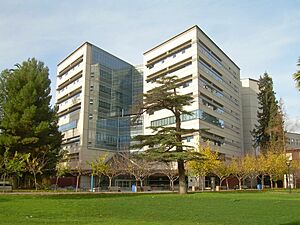
As of spring 2023, San José State University offered 150 different bachelor's degree programs. It also had 95 master's degrees and 5 doctoral degrees. SJSU is officially approved by the Western Association of Schools and Colleges (WASC).
SJSU's engineering college, the Charles W. Davidson College of Engineering, is the largest college on campus. It had 7,133 students in fall 2024. The Lucas College and Graduate School of Business was the second largest, with 6,745 students.
University Rankings
| THES World | 1001–1200 |
|---|---|
| Forbes | 87 |
| Most Innovative Schools | 3 |
| Top Public Schools | 3 |
| Best Colleges for Veterans | 3 |
| Top Performers on Social Mobility | 7 |
| Best Value Schools | 14 |
| Best Undergraduate Engineering Programs | 12 (At schools where doctorate not offered) |
| Computer Engineering | 12 |
| Electrical Engineering / Electronic / Communications | 8 |
| Mechanical Engineering | 12 |
| Nursing | 183 |
| Economics | 201 |
| Library and Information Studies | 23 |
| Occupational Therapy | 41 |
| Social Work | 77 |
| Speech-Language Pathology | 91 |
| Fine Arts | 110 |
| Nursing Schools: Doctor of Nursing Practice | 120-158 |
| Public Affairs | 124 |
| Public Health | 132 |
| Nursing Master's | 135 |
| Part-time MBA | 143 |
| Education | 162 |
San Jose State is highly ranked by many groups. In 2024, U.S. News & World Report ranked SJSU No. 3 in the western United States. It was also ranked No. 16 among all "regional universities" in the western U.S.
SJSU's undergraduate engineering program was ranked tied for No. 12 nationally in 2022-2023. This ranking was among colleges that do not offer doctoral degrees in engineering.
In 2022, Forbes magazine ranked SJSU No. 107 out of about 500 colleges in America. It was also ranked No. 43 among top public universities.
Money magazine ranked San Jose State No. 31 nationally in 2022. They also ranked SJSU No. 1 nationally in 2020 for "Most Transformative Colleges."
The Wall Street Journal/Times Higher Education College Rankings 2025 ranked SJSU No. 16 out of over 800 U.S. colleges.
Getting into SJSU
| 2024 | 2023 | 2022 | 2021 | 2020 | |
|---|---|---|---|---|---|
| Applicants | 37,132 | 35,780 | 34,783 | 30,441 | 32,375 |
| Admits | 31,419 | 28,708 | 26,083 | 25,682 | 21,810 |
| % Admitted | 84.6 | 80.2 | 75.0 | 84.4 | 67.4 |
| Enrolled | 4,604 | 4,519 | 4,036 | 4,220 | 3,325 |
| SAT composite (middle 50% range) | 1090–1330 | 1070–1320 | 1070–1370 | 1030–1310 | 1030–1240 |
| ACT composite (middle 50% range) | 24–30 | 22–28 | 21–29 | 20–31 | 19–26 |
| Average High School GPA | 3.53 | 3.50 | 3.60 | 3.54 | 3.55 |
| 2024 | 2023 | 2022 | 2021 | 2020 | |
|---|---|---|---|---|---|
| Applicants | 11,504 | 10,880 | 12,458 | 14,337 | 14,929 |
| Admits | 8.036 | 7,806 | 8,720 | 10,120 | 10,329 |
| % Admitted | 69.8 | 71.7 | 70.0 | 70.6 | 69.2 |
| Enrolled | 3,144 | 2,939 | 3,220 | 3,739 | 4,328 |
To get into SJSU, your high school grades (GPA) and test scores (SAT or ACT) are important. These scores create an "eligibility index."
In fall 2022, SJSU received over 34,000 applications from new high school students. About 75% of them were accepted. The average high school GPA for new students was 3.60.
Because so many students want to attend SJSU, it has become harder to get in. Even if you meet the basic requirements, admission is not guaranteed.
Faculty and Research at SJSU
SJSU is known for its research. In 2023, San Jose State spent $83.4 million on research and development. This placed it second among all 23 California State University campuses.
SJSU has special collections for research. These include the Ira F. Brilliant Center for Beethoven Studies and the Martha Heasley Cox Center for Steinbeck Studies.
SJSU also works with partners like the SJSU Metropolitan Technology Center at NASA Ames Research Center. It is also home to the Mineta Transportation Institute.
Since 2014, SJSU has run the Silicon Valley Big Data and Cybersecurity Center. This center helps faculty and Silicon Valley companies work together on cybersecurity research.
Air Force ROTC Program
SJSU has an Air Force Reserve Officer Training Corps (AFROTC) program. It is called Detachment 045. Students in this program learn leadership skills. They also take part in activities to become U.S. military officers. Students from other Bay Area schools can also join this program at SJSU.
Student Life at SJSU
| Race and ethnicity | Total | ||
|---|---|---|---|
| Asian | 35.9% |
|
|
| Hispanic/Latino | 29.6% |
|
|
| White | 13.6% |
|
|
| Other | 9.4% |
|
|
| Foreign national | 7.9% |
|
|
| Black or African American | 3.3% |
|
|
| Native Hawaiian or Other Pacific Islander | .4% |
|
|
| American Indian or Alaskan Native | .1% |
|
|
| Economic diversity | |||
| Low-income | 40% |
|
|
| Affluent | 60% |
|
|
| Student Body Origin (Returning students) | Fall 2024 |
|---|---|
| California: Santa Clara County | 44.6% |
| California: Bay Area (Outside Santa Clara County) | 35.0% |
| California: Non-local | 12.6% |
| International | 6.8% |
| Other U.S. | 0.9% |
SJSU is one of the largest universities in the CSU system. It attracts students from all over California, the United States, and 100 different countries. In fall 2022, 35,751 students were enrolled. About 51% of students were male and 49% were female.
As of 2022, SJSU had over 475 recognized student organizations. These include groups for academics, culture, religion, special interests, and sports clubs.
Fraternities and Sororities
SJSU has many social fraternity and sorority chapters. Some of these groups have their own houses near campus. About 6% of male students join fraternities, and 6% of female students join sororities.
Spartan Marching Band
The Spartan marching band includes students from all different fields of study. They perform a new halftime show at each home football game. They also have a pre-game show and a post-game concert. The band is unofficially known as "The Pride of the Spartans." They perform at all home football games and sometimes travel for away games.
Student News and Media
The school newspaper, The Spartan Daily, started in 1934. It is published three days a week when classes are in session. Journalism and advertising students create the newspaper. The newsroom is in Dwight Bentel Hall.
Update News is a weekly TV newscast made by students. It airs every weekend on KICU, Channel 36, in San Jose. It has been on the air in the Bay Area since 1982.
KSJS, 90.5 FM, is the university's student-run radio station. It started in 1963. KSJS broadcasts live San Jose State sports events. It also plays different types of music and has talk shows.
Cool Student Groups
W6YL is a student-run amateur radio station. It has been operating continuously for many years since 1927. The SJSU Amateur Radio Club W6YL is one of the oldest student groups on campus.
SJSU Sports and Athletics
San José State University has had sports teams since 1890. SJSU sports teams are called the Spartans. They compete in the Mountain West Conference (MWC) in NCAA Division I.
SJSU sports teams have won NCAA national titles in track and field, golf, boxing, fencing, and tennis. As of December 2022, SJSU has won 10 NCAA national team championships. They have also produced 50 individual national champions. SJSU is also famous for its judo program. It has won many National Collegiate Judo Association titles.
SJSU alumni have won 20 Olympic medals, including seven gold medals. These medals date back to 1948. SJSU athletes have won medals in swimming, judo, water polo, and boxing.
The track team, coached by "Bud" Winter, gave San Jose State the nickname "Speed City." This team produced Olympic medalists and social activists Lee Evans, Tommie Smith, and John Carlos. Smith and Carlos are famous for their raised fist salute at the 1968 Summer Olympics. A monument of this protest was built on Tower Lawn in 2005.
The Spartan football team had a great season in 2012, finishing with 11 wins and 2 losses. They were ranked nationally for the first time since 1990. In 2020, the team won its first conference championship title since 1991. They finished the 2020 season with 7 wins and 1 loss.
Club Sports at SJSU
Besides its NCAA Division I sports, SJSU has many club sports. There are about 25 sports and 50 teams. Many of these teams are run by students. Some have paid coaches and support from alumni.
Club sports at SJSU include:
- Men's and women's archery
- Men's and women's badminton
- baseball
- Men's and women's basketball
- Men's and women's bowling
- Men's and women's boxing
- Men's and women's cycling
- dancesport
- Men's and women's dragon boat racing
- esports
- Men's and women's fencing
- Men's and women's figure skating
- Men's and women's gymnastics
- Men's and women's ice hockey
- Men's and women's judo
- Men's and women's lacrosse
- mountain biking
- Men's and women's powerlifting
- Men's and women's quidditch
- Men's roller hockey
- Men's and women's rugby
- salsa
- Men's and women's soccer
- softball
- Men's and women's swimming
- track and field
- triathlon
- ultimate Frisbee
- Men's and women's volleyball
- Men's and women's water polo
- Men's and women's wrestling
SJSU Traditions
The old campus bell was bought in 1881. It used to chime every morning at eight o'clock. The 1906 San Francisco earthquake stopped it from ringing. When Tower Hall was built in 1909, it was designed to hold the old bell. The bell is still displayed today near Tower Hall.
In 1922, the school officially chose the Spartans as its mascot. In 1925, students decided to keep the school colors as gold and white. Later, blue was added as an official school color.
"Spardi Gras" was a fun annual event held from 1929 to 1960. It was a big celebration with games and activities for all students. "Spartan Revelries" was another long-standing event. It was a musical show created and performed entirely by students.
"Sparta Camp" was an annual retreat for students interested in student government. It was held from 1953 to 1965. A similar event, "Freshman Camp," helped new students get used to campus life.
The chimes heard on the SJSU campus every 15 minutes are Westminster chimes. They were a gift from the class of 1947. They sound like the famous Big Ben chimes in England.
Students and alumni show their Spartan pride by wearing blue and gold every Thursday. During homecoming week, SJSU hosts many events leading up to the homecoming football game.
School Songs
"Hail! Spartans, Hail!" is the university's official alma mater. The words were written by Gerald Erwin, a student who graduated in 1933. The song was officially adopted in 1929. When the alma mater is played, students stand and sing along.
The university also has a fight song. It is usually played or sung at the end of football games and other sports events.
Famous SJSU Alumni
(Attended '68-'70) and Stevie Nicks (right)
(Attended '68-'70)
Musicians best known for Fleetwood Mac
(B.A., '57)
First Native American to be elected to the United States Senate and member of the first US Olympic judo team
(Attended '68-'69)
and Tommie Smith (center) (B.A., '69)
Track and field athletes known for a 1968 Protest
(B.S., '54)
Primatologist and conservationist known for studying mountain gorilla groups
(B.A, '55)
Football coach in the Pro Football Hall of Fame and three time Super Bowl champion
About 60% of San Jose State's 275,000 living alumni (former students) live in the San Francisco Bay Area. SJSU is known for sending many graduates to science and technology companies in Silicon Valley. In 2015, SJSU was the top school for hiring at Apple Inc.. It also ranked 9th for hiring at Facebook.
Some famous SJSU alumni in science and engineering include:
- Ray Dolby, who started Dolby sound systems.
- Dian Fossey, a scientist who studied gorillas.
- Gordon Moore, who founded Intel Corporation and created "Moore's law."
- Ed Oates, who helped start Oracle.
Many former SJSU students have founded or led major companies. These include Dolby Laboratories, Intel Corporation, Oracle Corporation, and WhatsApp.
Many musicians also attended San Jose State. These include Doug Clifford and Stu Cook from Creedence Clearwater Revival. Also, Tom Johnston and Patrick Simmons from the Doobie Brothers. And Lindsey Buckingham and Stevie Nicks from Fleetwood Mac.
Other notable SJSU alumni include:
- Lou Henry Hoover, a former First Lady of the United States.
- Novelists Amy Tan and Jayne Ann Krentz.
- Fashion designer Jessica McClintock.
- Football coaches Dick Vermeil and Bill Walsh, who won a combined four Super Bowls.
- Golfer Ken Venturi, who won the 1964 U.S. Open.
More to Explore
- California Master Plan for Higher Education
- Education in California
- List of American state universities
See also
 In Spanish: Universidad Estatal de San José para niños
In Spanish: Universidad Estatal de San José para niños
 | Isaac Myers |
 | D. Hamilton Jackson |
 | A. Philip Randolph |


